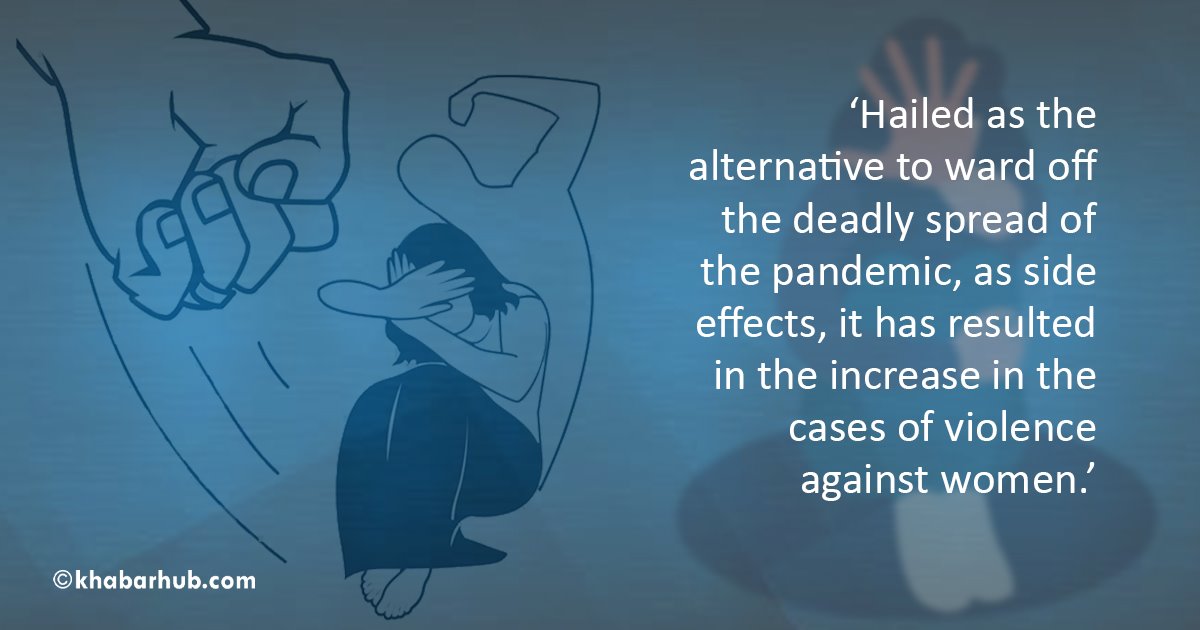KATHMANDU: With COVID-19’s grip over 210 countries and around 90 countries in lockdown, more than 4 billion people are now at home. Hailed as the alternative to ward off the deadly spread of the pandemic, as side effects, it has increased in the cases of violence against women (VAW).
While the country is still in lockdown, the National Women Commission’s helpline 1145 rang with a complaint since the beginning of lockdown. A woman from Nuwakot complained that she is tortured by her in-laws.
She narrated that her husband is in foreign employment and she is living with her mother-in-law and brother-in-laws. “I used to get sarcastic remarks from the brother-in-laws,” she sobbed, “Today, my mother-in-law thrashed me badly, and showed me the door. Where can I go now?”
Another woman from Udayapur gave a call to complain about the atrocities from the husband. Her husband, a drunkard, turned a regular torturer to her. “In his drunken frenzy he has kicked me out from home,” she pleaded in the commission adding, “I have taken shelter at neighbors. I am worried about the children, they might be starving.”
The women are now in a double panic: the coronavirus and the domestic violence.
“Thinking that the women cannot go out or protest during the lockdown, some sadist men have been torturing women these days,” Pabitra Subedi, the manager of the commission’s helpline.
The officials reveal that the Commission’s helpline has become busier during the lockdown.
“Out of 115 phone calls the commission received till April 9, forty-two were the complaints related to VAW,” Dhruva Raj Chhetri, the information officer at the Commission said, “73 calls were related with queries about coronavirus.
As everyone is at home during the lockdown, they are likely to recall past misunderstanding and triggered by the drinks are likely to ill-treat women or even banish the women from home.
Chhetri informed that the commission has informed the local government and also advised the victims to inform the police.
“In case of physical assault against women, we have informed the police and instructed them to go to the house of the victim and comfort them and ensure justice,” Chhetri added.
The incidence of VAWs, province-wise
According to Nepal Police, there have been 104 cases of VAWs since the enforcement of lockdown on Mar. 24 to Apr.5.
Most of VAWs include rape, attempted rape, polygamy, child marriage, the allegation of witchcraft, forced abortion, caste discrimination, child sexual abuse and other domestic violence.
According to SSP Umesh Raj Joshi, the Nepal Police Spokesperson, Province 2 and Far-Western Province have the highest cases of VAWS. They had 17 such cases from March 24 to April 5. Province 1 had the second-highest numbers 14.
Surprisingly Bagmati Province had more cases of violence than Karnali Province. According to the data at police headquarter, there had been 11 cases of violence against women in Bagmati in the two weeks from March 24- April 5 whereas Karnali Province reported only 9 cases. Gandaki Province had the lowest cases of violence with just 5 such cases in the given time.
In the case of domestic violence, however, there have been 16 such cases reported in the valley in the past 15 days. Most of the cases of domestic violence go unrecorded as the majority of women, due to illiteracy and ignorance, don’t record them formally.
Psychiatrists’ advice
Most of the people who used to have a busy schedule before are lying idle due to lockdown. According to Dr. Saroj Ojha, males are seen as more worried about the consequences than their female partners.
“As males are held more responsible to look after the family during such crisis, males feel more under stress,” Dr. Ojha a psychiatrist by profession told Khabarhub. “To divert such stress they busy themselves in playing cards, drug addiction, alcoholism or getting entangled in the social medial; such males shower violence against women.”
Dr. Ojha regards positive attitude, valuing family love and regarding the lockdown as an opportunity to spend time together in the family as the best measures to reduce such violence.
“Keep yourself busy with the family as this is the best time for you to do so,” Dr. Ojha advises to all males, “prepare the meals, busy yourselves in cleaning and gardening as it keeps you stress-free and helps you know the gravity of the roles your female partners bear in the family.”









Comment